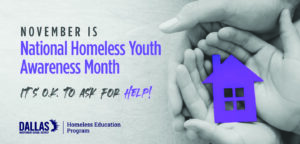By Stephanie Quinn
The number of Dallas ISD students who experience homelessness or housing instability each year could fill all the available beds nationwide (4,117, according to Elevate North Texas Youth Shelter).
Both numbers are horrifying and unacceptable.

That’s why Impact Communities-Dallas County supports National Homeless Youth Awareness Month and urges everyone to become familiar with the homeless youth situation in Dallas County. Imagine an economic disaster occurs in your family. One month, you and your three school-aged children are comfortable in your two-bedroom apartment and the next month your landlord raises the rent so high you are forced to leave, although you have nowhere to go.
This scenario is all too true for many families in Dallas County.
“Youth homelessness places students at a much higher risk for addiction, mental health challenges, encounters with the justice system and/or incarceration, human trafficking and suicide,” says Stephanie Quinn, Dallas County Community Coalition coordinator.
“The risk is even higher for youth who identify as LGBTQ+ because many of them lose parental care if they are kicked out of their homes.”
Last year, Dallas County led the state with the highest number of homeless families and individuals. Impact Communities is committed to supporting efforts and programs that ease homelessness challenges in Dallas County and North Texas.
Impact Communities’ mission is to ignite communities to work together to build and strengthen youth resilience. Impact Coalitions are in Waxahachie, Red Oak, Dallas County, and Navarro County. These are groups of community volunteers who provide public education, law enforcement and public policy strategies to prevent youth substance use and build healthy communities.
The group’s vision is to give young people a strong belief in themselves, the skills and support to make excellent life choices, as well as developing the resources and resilience needed to grow into healthy adults. Impact collaborates with community partners to educate youth and adults on the power of prevention. Visit the website impactcommunities.org to learn more.
